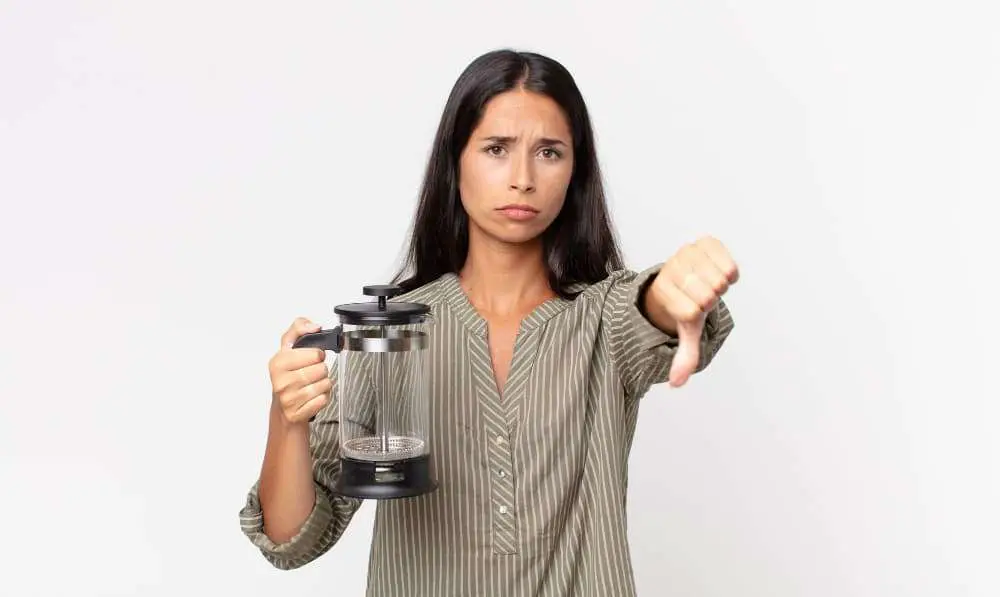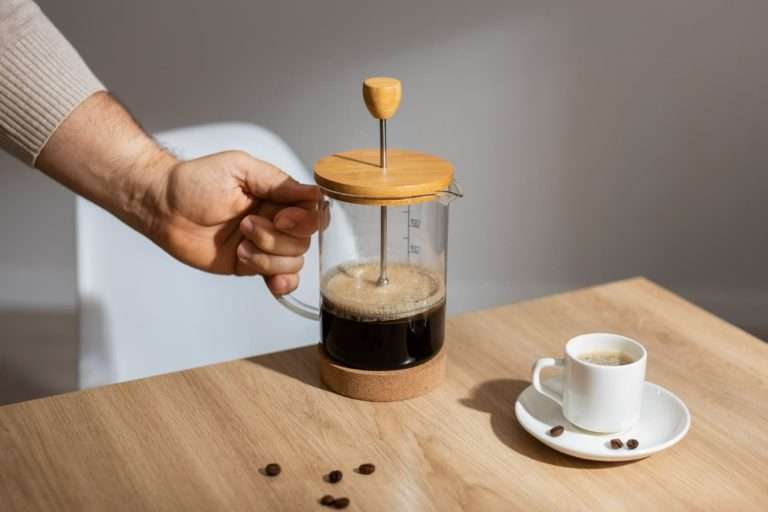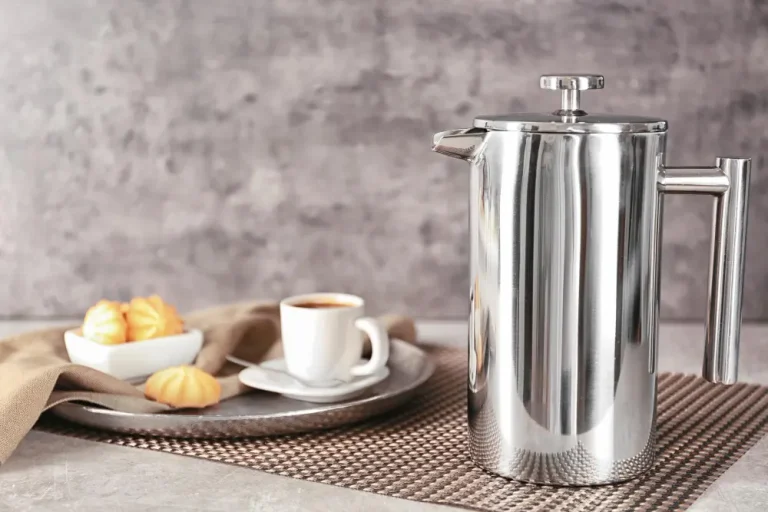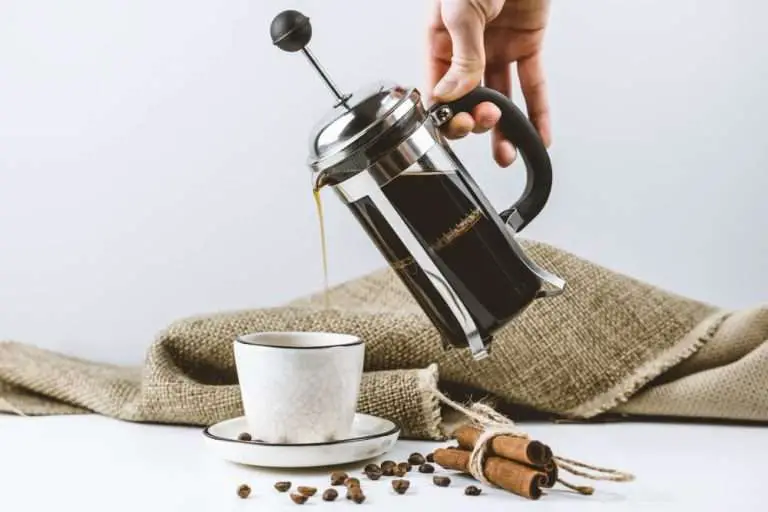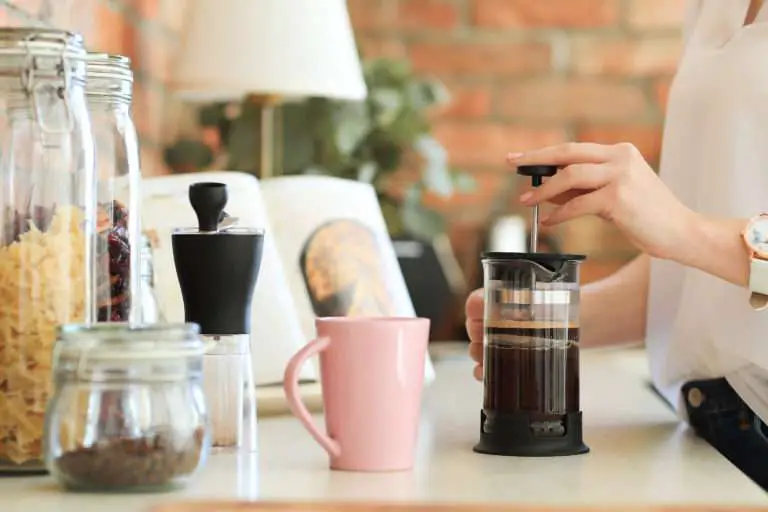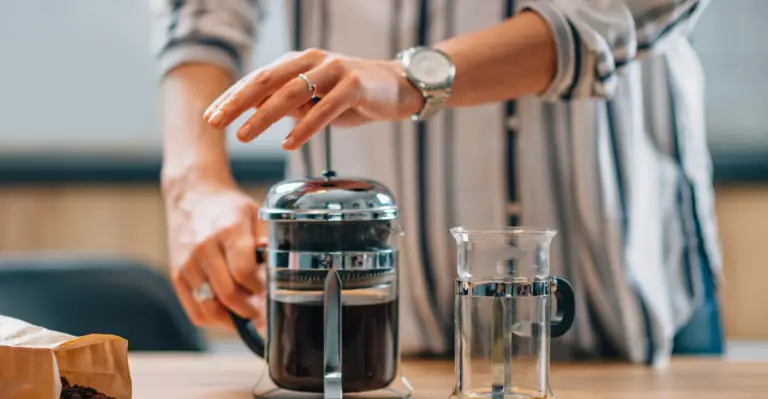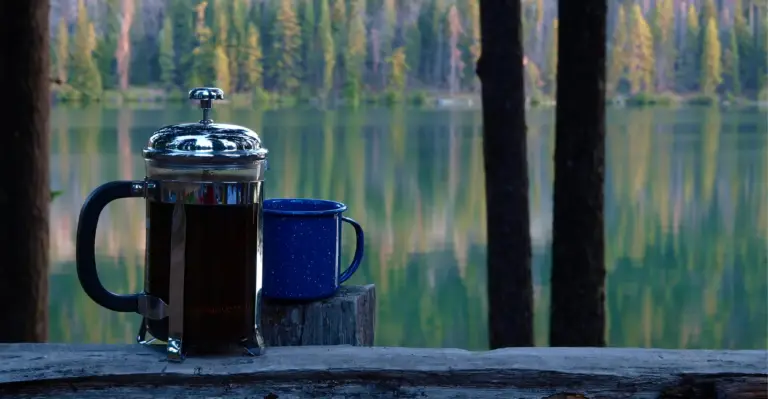10 Reasons Why Your French Press Coffee is Too Bitter
There’s nothing better than a fresh cup of French press coffee in the morning. The rich, bold flavor is hard to beat. But sometimes, you take that first sip and realize your French press coffee is too bitter! What happened?
Bitter coffee can ruin an otherwise perfect cup. If you’ve noticed your French press brews tasting more bitter than you’d like, you’re not alone. It’s a common issue many French press fans face when their french press coffee is too bitter.
The good news is there are some simple reasons for this. Your french press coffee may turn out overly bitter. In this article, we’ll look at the top 10 causes. We’ll also cover some easy solutions.
These can help you brew a less bitter cup of French press. Small changes to your technique can make a big difference. Read on to find out what’s making your french press coffee too bitter. Learn how to finally get the great tasting brew you want every morning.
Reason 1: Grind Size is Too Fine
The grind size you use for French press is very important. It has a big impact on flavor. Fine coffee grinds can make your French press coffee taste bitter.
- Finely ground coffee over-extracts. This means too many flavors get pulled out from the grinds. These extra flavors make the coffee taste bitter.
- Coarsely ground coffee is best for French press. It prevents over-extraction so your coffee tastes balanced.
- If your grind is too fine, you’ll taste bitterness, dryness and hollow flavors. Grounds that are too powdery clog the filter making pressing difficult.
- A proper coarse grind for French press looks gritty, like coarse sand.
So how do you get the right size grind?
- Use a burr grinder if possible. Check the grind settings to ensure you select the course.
- If buying pre-ground coffee, get a coarse grind labeled for French press.
- Hand grinders also allow coarse grinding.
- Ask your local cafe to grind your beans coarsely.
With the right grind, your French press coffee will taste smooth and full.
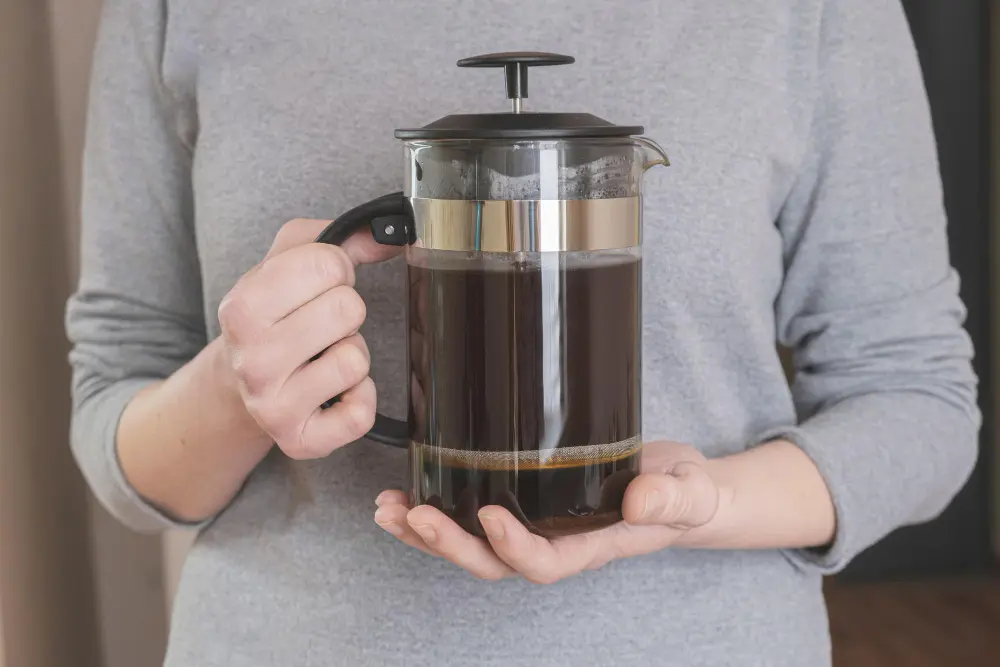
Reason 2: You’re Over-Extracting the Coffee
Over-extraction is another common reason for bitter French press coffee. So what is over-extraction exactly?
- It’s when too many flavor compounds get pulled out of the coffee grounds. This makes the coffee taste unbalanced and bitter.
- During ideal extraction, the sweeter flavors extract first. Then the bitter flavors extract. Over-extraction means the bitter notes dominate.
- Ideal extraction is about 1.5 times the weight of the coffee in water. So 15 grams of coffee should be extracted into 22-23 grams of water.
- Extraction over 25% starts moving into over-extraction territory. The coffee will taste more bitter and astringent.
You can prevent over-extraction in your French press:
- Use a coarse grind size to slow down extraction.
- Lower your water temperature slightly. This reduces how quickly flavors extract.
- Cut back on brew time. Try 3 minutes instead of 4.
- Use less coffee so there are fewer solubles to extract.
With these tweaks, you can achieve balanced extraction and prevent bitterness.
Reason 3: Your Water is Too Hot
The temperature of the water you use is very important for flavor. Hotter water can make your French press coffee taste bitter.
- Hot water extracts the coffee flavors more quickly. This leads to over-extraction and bitterness.
- The ideal water temperature for the French press is 195°F to 205°F. This gives balanced extraction.
- Water that is too hot, over 205°F, will make the coffee bitter and acidic. The ideal sweetness and aromas won’t develop.
- Boiling water is typically 212°F, which is too hot for proper French press extraction.
So how do you get the right water temperature?
- Use a thermometer to measure precisely. Quickly check right before you pour water over the grounds.
- Or, boil water first, then take it off heat and wait 15 seconds before pouring.
- You can also try slightly under-boiling your water when heating.
- Start with water a few degrees lower and adjust up if needed.
The right water temperature helps highlight the coffee’s inherent flavors, giving a smooth brew.
Reason 4: You’re Letting it Brew Too Long
Brew time is critical for avoiding french press coffee that is too bitter.
- The brew time impacts how much coffee flavor is extracted. Too long can lead to over-extraction and bitterness.
- The recommended brew time for french press coffee is 4 minutes. This maximizes flavor without excessive bitterness.
- Brewing your french press for longer than 4 minutes causes over-extraction. More bitter notes will be present making your coffee too bitter.
- Excessive brewing can also cool your french press coffee, reducing ideal extraction temperature.
You can control brew time and prevent over-extraction:
- Use a timer or stopwatch to track the exact minutes spent brewing.
- Start timing as soon as you pour the water over the grounds.
- Stop the brewing at 4 minutes by plunging the filter down.
- If your french press coffee is coming out too bitter, try reducing time to 3 minutes.
With the right brew time, your french press will highlight sweetness and aroma for a balanced cup.
Reason 5: You Use Too Much Coffee
The amount of coffee you use for the water is also key. Too much coffee can lead to an over-extracted and bitter french press.
- The proper coffee to water ratio impacts how concentrated your brew is. Too much coffee over-extracts.
- The ideal ratio for french press coffee is 1:15. That’s 1 gram of ground coffee for every 15 grams of water.
- Using too much coffee, like a 1:10 ratio, results in over-extraction. There are more coffee solubles to extract, making it taste bitter.
- High coffee ratios also make french press taste strong and acidic without the sweetness.
You can measure the perfect ratio:
- Use a kitchen scale to weigh your water and coffee in grams for accuracy.
- For a typical mug size of 8 oz of water, use 15 grams of coarse ground coffee.
- You can also calculate ratios by volume using measuring cups and tablespoons.
- But for best flavor, weighing with a scale is recommended.
The right coffee to water ratio helps make a balanced, sweeter cup of french press.
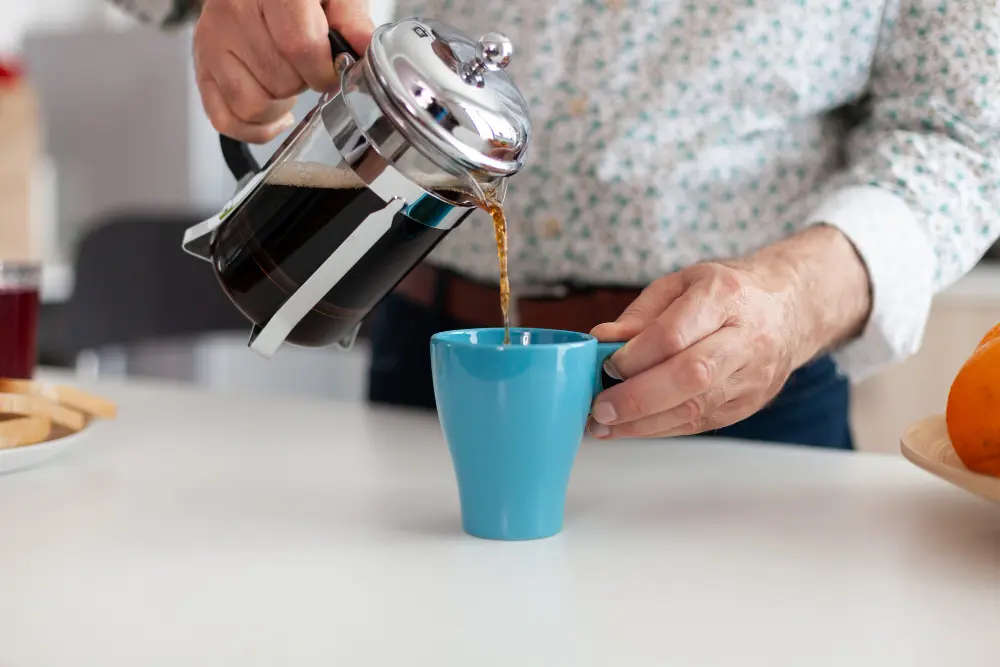
Reason 6: You Have Poor Quality Water
The quality of the water you use can really impact your french press coffee flavor. Poor quality water leads to bitterness.
- Hard water with high mineral content over-extracts coffee, making it bitter. The minerals interact with coffee compounds.
- Chlorine in some tap water can impart off-tastes. Sulfur and other contaminants also influence flavor.
- Ideal water for french press is pure and free of heavy mineral content. This allows clean extraction.
- Reverse osmosis filtered water or bottled spring water typically have the right composition.
You can improve your french press water:
- Use a water filtration system like Brita or ZeroWater to remove impurities.
- Switch to bottled spring or purified water for your coffee. Look for low mineral content.
- Avoid distilled water which can flatten flavors due to lack of minerals.
- If using tap water, let it sit out overnight so chlorine dissipates.
With better water quality, your french press coffee will taste clearer and truer to the bean.
Reason 7: You’re Using Stale Coffee Beans
Using stale, old coffee beans can also contribute to french press coffee that’s too bitter. The freshness of the beans makes a big difference.
- As coffee beans sit after roasting, the flavors degrade and bitterness increases. Oils go rancid faster in pre-ground coffee.
- The bitterness and other harsh flavors extract out more readily from stale beans since the pleasant aromatics have faded.
- For optimal freshness, whole beans should be used within 2 weeks after roasting. Pre-ground coffee stales much quicker.
- Store beans in an airtight, opaque container out of sunlight. Light and air accelerate staling.
For best french press flavor:
- Buy beans with a recent roasting date and use them up quickly.
- Choose local roasters who roast fresh weekly. The roast date should be marked.
- Avoid cheap grocery store beans which likely aren’t freshly roasted.
- Grind beans right before brewing if possible for full aroma.
The fresher your beans, the sweeter and more nuanced your french press coffee.
Reason 8: You’re Using Low Quality Beans
The quality grade of the beans themselves can also lead to bitter french press coffee. Cheap commodity-grade beans often produce bitterness.
- Lower quality beans have more defects, underripe beans, and less flavor nuance that leads to bitterness.
- Careless processing methods that damage the bean like over-fermentation also increase bitterness.
- Higher grades of Arabica beans from ideal growing conditions have an inherent sweetness and complexity.
- Seek out specialty-grade beans like AA or AAA. Check that the roaster sources quality, ethically-sourced beans.
When buying beans:
- Avoid cheap bulk beans from large chains. These are usually old, low-quality commodity-grade.
- Find local specialty roasters who profile the flavor of each bean. They often let you sample.
- Check the roast date and brewing suggestions. You want recently roasted beans.
- Consider ordering beans online from reputable roasters if needed.
Starting with quality whole beans is key for balanced, sweet french press coffee.
Reason 9: It’s a Dark Roast Style
If you find your french press coffee too bitter, the dark roast style may be part of the issue. Dark roasts lead to more bitterness.
- Dark roasts are heated longer, reducing acidity but developing more bitter, charred flavors. Think smoky, burnt taste.
- Light and medium roasts have more brightness and sweetness from beans’ natural flavors before additional roasting.
- Overly dark roasts destroy the nuanced flavors by charring the beans. Bitter, ashy notes dominate.
- Sample different roast styles from light to dark. Take notes on your taste preferences to choose your ideal roast.
When buying beans for french press:
- Select a medium roast for balanced sweetness and body without heavy bitterness.
- Experiment with beans from the same origin roasted to different levels to understand the change.
- Ask roasters for a medium roast with low bitterness if you dislike very dark styles.
- Always check the labeled roast date – darker roasts stale fastest.
The right roast level allows the bean’s complex flavors to shine through for a smooth french press.
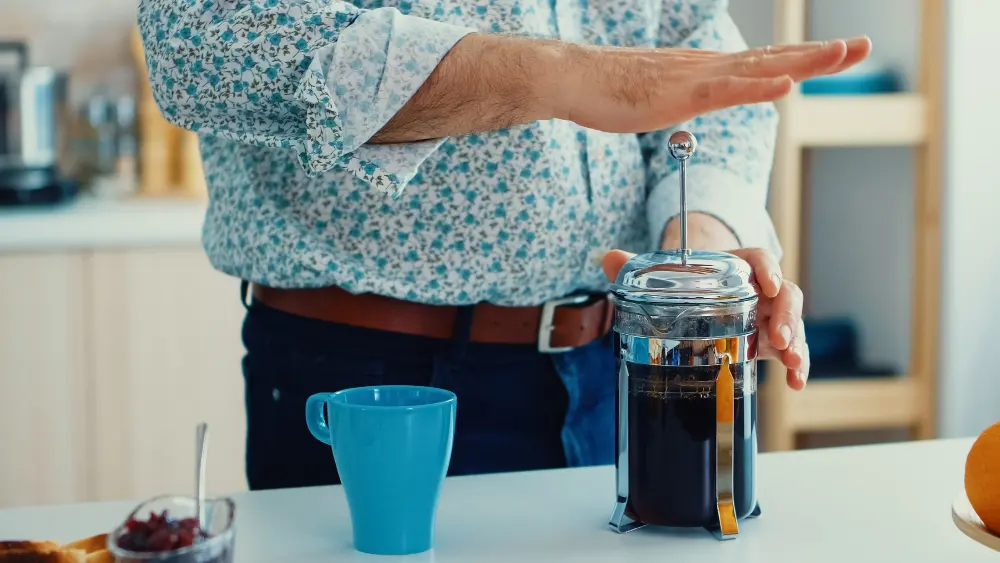
Reason 10: You’re Using Robusta Beans
The variety of coffee beans used can also lead to bitter french press coffee. Robusta beans create more bitterness than Arabica.
- Robusta beans have around twice the caffeine and chlorogenic acid content as Arabica. This leads to a harsher, more bitter taste.
- Arabica beans have more sweetness, complexity, and aroma. Their flavor profile is best suited for french press.
- Many cheaper coffee blends contain Robusta to lower costs. Always check that your beans are 100% Arabica.
- Single-origin beans are typically Arabica. Blends may mix Arabica with cheaper Robusta without detailing percentages.
For better french press:
- Stick to specialty grade, 100% Arabica beans for balanced flavor without bitterness.
- Check with your local roaster or read package labels to confirm Robusta beans aren’t used.
- Try beans from reputable regions known for Arabica like Colombian or Ethiopian.
- Avoid bulk or discount beans which likely contain Robusta filler beans.
Choosing high-quality Arabica beans avoids the harshness of Robusta for smooth french press coffee.

How to Make French Press Less Bitter
Now that you know what causes bitter french press coffee, here are some top tips to troubleshoot and fix it:
- Use a coarse grind size. Finer grinds over-extract, so stay coarse.
- Control water temperature. Aim for 195°F to 205°F water. Boiling water is too hot.
- Brew for 4 minutes only. Any longer leads to over-extraction.
- Stick to a coffee-to-water ratio of 1:15. More coffee amps up bitterness.
- Buy a water filter if needed. Good water quality prevents bitterness.
- Only use freshly roasted beans within 2 weeks of the roast date.
Here is a checklist to brew better french press coffee:
- Quality burr grinder
- Coarse grind setting
- Pure water at 195°F – 205°F
- 1 gram of coffee for every 15 grams of water
- Precise 4 minute brew time
- Press filter gently without over-agitating
And here are some key don’ts:
- Don’t use fine grind for french press
- Don’t boil water – lower temp slightly
- Don’t brew for longer than 4 minutes
- Don’t use more than 1:15 coffee ratio
- Don’t use old, stale coffee beans
Follow these tips and you’ll be tasting smooth, sweet french press coffee without bitterness.
FAQs
1. Why does my French press coffee taste bad?
There are a few common reasons your French press coffee can taste bad:
– Over-extraction leading to bitterness – Grind size too fine, water too hot, brewing too long
– Poor water quality – Hard water or impurities like chlorine making it taste off
– Old coffee beans – Stale beans losing aromatics and tasting bitter or rancid
– Incorrect coffee-to-water ratio – Too much coffee concentrating the flavors too much
– Inconsistent grinding – Uneven grind with fine powder and large chunks
Follow proper brewing techniques and use fresh, coarse ground coffee with filtered water to improve the taste.
2. How can I make my French press coffee less bitter?
To reduce bitterness in French press coffee:
– Make sure your grind size is coarse enough. The finest particles over-extract.
– Lower the water temperature slightly – around 200°F is ideal.
– Cut down on brew time. Try 3-4 minutes max instead of longer.
– Reduce the amount of coffee grounds you use to avoid over-extraction.
– Switch to filtered or bottled water instead of tap water if needed.
– Rinse the filter first to remove paper flavor that can impart bitterness.
3. Is French press coffee supposed to be bitter?
While a slight bitterness is normal, French press shouldn’t be overly bitter. Too much bitterness means it is over-extracted. Dial in the proper brewing method to minimize excessive bitterness.
4. Why is my French press coffee so strong?
Using too much coffee for the amount of water can make the French press taste too strong. Try reducing the amount of grounds to hit the ideal 1:15 coffee-to-water ratio by weight. This prevents over-extraction from too many grounds.
5. Why does my French press coffee taste bitter?
The most common reasons French press tastes bitter are:
– Grind is too fine leading to over-extraction
– Water is too hot, over 205°F
– Brew time exceeds 4 minutes
– Hard water or poor water quality
– Using stale, old coffee beans
6. How do I fix bitter French press coffee?
To fix bitter French press:
– Grind beans coarser
– Use 195°F – 205°F water
– Brew for just 4 minutes
– Use filtered or bottled water
– Buy freshly roasted beans and use within 2 weeks
7. What am I doing wrong with my French press?
If your French press coffee is too bitter, strong, or tastes bad, some things to check are:
– Your grind size is too fine
– You’re brewing for longer than 4 minutes
– Water temperature is too high
– Beans are stale or low quality
– You’re using tap water with off tastes
8. How can I improve my French press results?
Tips for better French press coffee:
– Burr grind fresh beans to a coarse consistency
– Heat filtered water to 200°F before brewing
– Use a 1:15 coffee-to-water ratio by weight
– Gently plunge filter after 4 minutes
– Rinse filter first and keep equipment clean
– Store beans properly and use within 2 weeks
Conclusion
Now that you know the top reasons your french press coffee may be too bitter, you can troubleshoot and adjust your technique for a smoother, better tasting brew.
Focus on using a coarse grind, controlling water temperature and brew time, and using filtered water and fresh beans. With the right tools and methods, you can achieve delicious, balanced french press coffee without excessive bitterness.
The key is being consistent and precise with your ratios, times, and measurements. Dialing in these parameters helps highlight the aromatic, nuanced flavors from quality beans for an amazing cup of french press every time.

